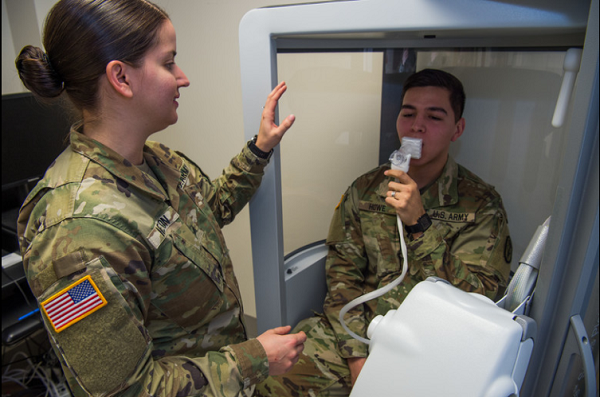Army Respiratory Specialist (MOS 68V) assist with the management of a respiratory unit.
Respiratory Specialist administer respiratory therapy and perform pulmonary function test.
This work is performed under the supervision of a physician or nurse anesthetist.
Click Here to see a complete US Army careers list.
Qualifications and Training
The Respiratory Specialist is an advanced level position.
Individuals wishing to enter the Army as a Respiratory Specialist must score a minimum of 102 on the Skilled Technical (ST) portion of the ASVAB test.
To enter into this MOS, recruits must have specific college level courses prior to entering.
As of 2012, METC (Medical Education & Training Campus) has provided a curriculum that allows recruits to enter into the program without the required training.
METC provides 12 weeks of college level courses that contribute to the requirements of the Respiratory Therapy program.
METC Respiratory Therapist training has two phases.
The first phase consists of resident training at METC and the second phase consist of clinical training at a military or civilian medical treatment facility.
At the end of this training, soldiers will have an Associate’s Degree with an emphasis on Respiratory Care.
Soldiers will also be eligible to take the National Certified Respiratory Therapy Test.
Job training includes 10 weeks of Basic Combat Training.
The Advanced Individual Training is for a total combination of 36 weeks, including inpatient care.
Skills that are helpful in this MOS include:
- Attention to detail
- Enjoy helping others
- Effective communication
- Ability to work under stress
- Interest in a job involving science
Related Article-Army Medical Logistics Specialist (MOS 68J): Career Details
What Does a Respiratory Specialist Do?
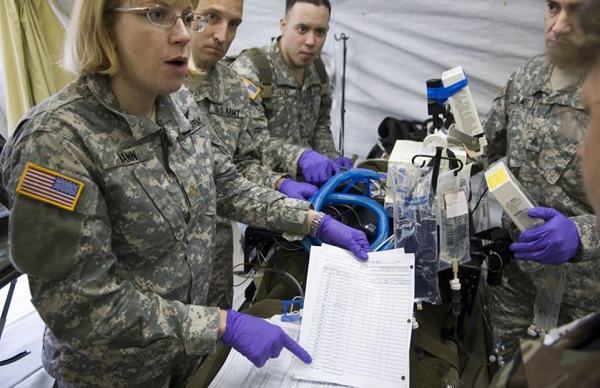
Respiratory Specialist are highly skilled individuals.
They may be required to work any time of the day, or day of the week.
Soldiers in this MOS may work in a fixed or deployed location.
They are required to be knowledgeable in emergency medical treatment and basic nursing care.
Specialist understand the human body and methods for diagnosing diseases.
In their position, specialist often assist with minor surgical procedures and clinical laboratory procedures.
Their main job function is to administer respiratory therapy.
This can be to ill, critically ill or emergency patients.
They must be familiar with the respiratory and cardiovascular system.
Specialist will use a variety of medical equipment and computer-programming to complete their work.
Respiratory Specialist complete pulmonary function testing.
It is the specialist job to understand congenital pulmonary and cardiovascular anomalies.
They must be familiar with recognizing anomalies in adults, children and infants.
They are required to not only assist, but monitor critically ill patients.
This includes working in a laboratory performing arterial blood gas analysis, EKG’s, and monitoring cardiac rhythms.
While working in the laboratory, specialist may also administer cardiopulmonary stress-tests or measure lung volumes.
Specialist will use mechanical ventilators and must be aware of side effects of using a mechanical ventilator.
They will make adjustments to life-support systems.
Whenever specialist conduct treatment in a non-emergency situation, they attempt to interview the patient.
The specialist will record any medical history and use it to make a decision on treatment.
In addition to interviewing patients, the specialist will keep all health records and clinical files up-to-date.
Specialist examine and treat battlefield patients.
They will maintain a patient airway in a critical or emergency event.
In these situations, specialist will manage a patient’s airway using medical gas therapy, administering cardiopulmonary medication and chest physiotherapy.
Respiratory Specialist will use medical gases, humidity and aerosol therapy to treat a patient.
The specialist will also provide cardiac support in an emergency situation.
Specialist assist with administering medication.
They can be required to help both in patient and outpatient individuals.
At times, the specialist may take and prepare blood samples for laboratory analysis.
They also assist with patient transport within the care facility setting.
Some specialist join the Critical Care Air Transport Team that transports patients from one facility to another.
Related Article-Army Preventative Medicine Specialist (MOS 68S): Career Details
What Does a Respiratory Specialist get Paid?
All Army position receive base pay that is factored from your rank and time of service.
This position is not an entry-level position, and the pay will be dependent on your rank upon completion of training.
The base pay table below can be followed for an idea on Army rank and pay.
| Insignia | Pay Grade | Rank | Abbreviation | Minimum Monthly Pay |
|---|---|---|---|---|
| E-1 +4 months | Private | PVT | $1,917.60 | |
| E-2 | Private Second Class | PV2 | $2,149.20 | |
| E-3 | Private First Class | PFC | $2,259.90 | |
| E-4 | Specialist | SPC | $2,503.50 | |
| E-4 | Corporal | CPL | $2,503.50 | |
| E-5 | Sergeant | SGT | $2,730.30 | |
| E-6 | Staff Sergeant | SSG | $2,980.50 | |
| E-7 | Sergeant First Class | SFC | $3,445.80 | |
| E-8 | Master Sergeant | MSG | $4,957.20 | |
| E-8 | First Sergeant | 1SG | $4,957.20 | |
| E-9 | Sergeant Major | SGM | $6,055.50 | |
| E-9 | Command Sergeant Major | CSM | $6,055.50 | |
| E-9 | Sergeant Major of the Army | SMA | $6,055.50 |
Benefits
In addition to the base pay described above, the Army provides benefits to all soldiers.
They also provide recruiting bonuses for certain positions and special pay opportunities.
Army benefits include:
- Tuition Assistance
- Annual Military Clothing Allowance
- Paid housing and food
- Medical and dental
- Paid sick time
- Paid vacation
- Low-cost life insurance
Job Reviews
Working as a Respiratory Specialist is hard work.
The position requires you to work odd hours and be alert in emergency situations.
Your quick thinking could make a difference to a patient’s health.
Reviews of this MOS discuss that the position is hard, but rewarding.
There are opportunities for increased responsibility and training.
Negative reviews talk about the long or odd hours and the movement.
The reviews below provide more positive and negative aspects of the position.
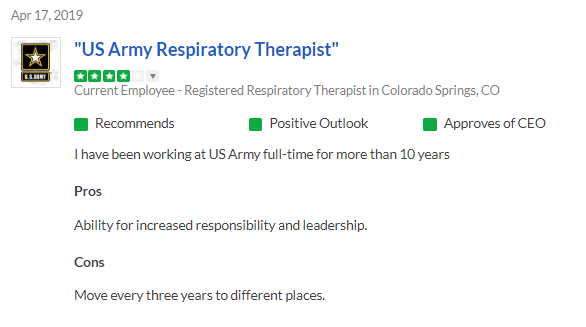
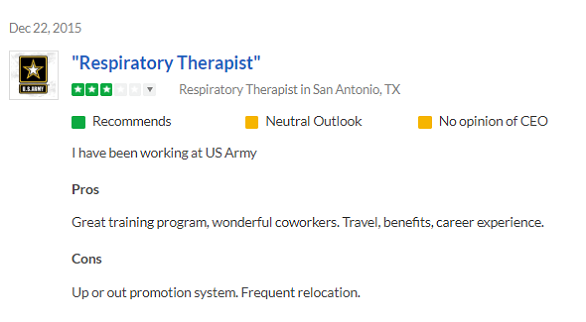
Related Article-Army Physical Therapy Specialist (MOS 68F): Career Details
Civilian Career Opportunities
Working in this MOS provides soldiers with skills to be successful in the civilian medical industry.
Soldiers can find related positions as emergency medical technicians, medical assistant/aid and a physicians assistant.
With advanced training, soldiers can take the certification test as a National Board for Respiratory Care Respiratory Therapist.
This allows for civilian career opportunities as a Respiratory Therapist.
This position also qualifies for the PAYS recruiting program, which guarantees an interview with a Military friendly employer.
Summary
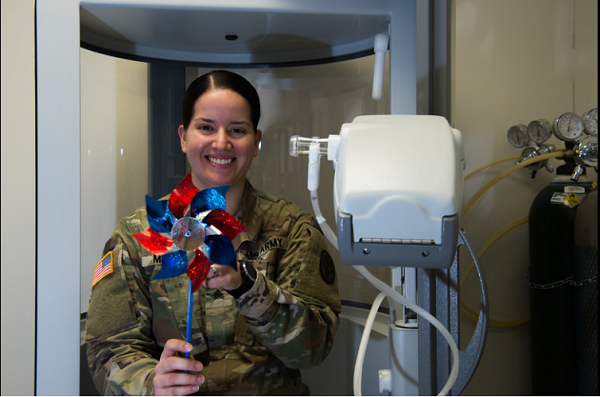
Army Respiratory Specialist (MOS 68V) assist in administering respiratory therapy.
They help patients of all ages with respiratory and pulmonary function testing and emergency care.
This is an advanced level position requiring college level classes to enter.
Soldiers can attend the training program from METC to enter into this MOS.
Pay will follow the Army base pay table and benefits will be allotted.
Soldiers who have worked in the Army as Respiratory Specialist discuss how difficult, but rewarding the position can be.
Individuals can find similar civilian career opportunities in hospitals, nursing homes and rehabilitation centers.
Related Article-Army Radiologist Specialist (MOS 68P)
References
METC Respiratory Training Program
US Army Medical Department Program Article
- Ikon Pass Military Discount: Learn How To Save Big - January 31, 2025
- RTIC Military Discount: Find Out How To Save Big on Gear - January 30, 2025
- Traeger Military Discount: Learn How To Save Big on Smokers - January 28, 2025

